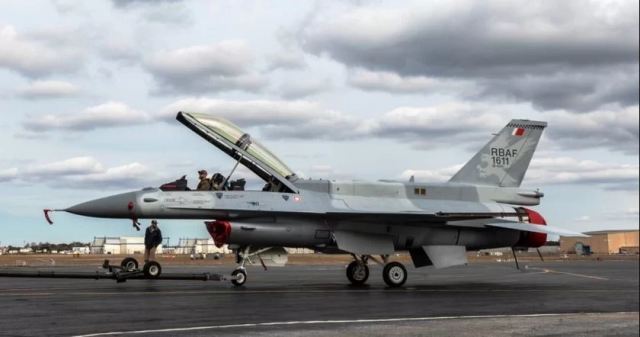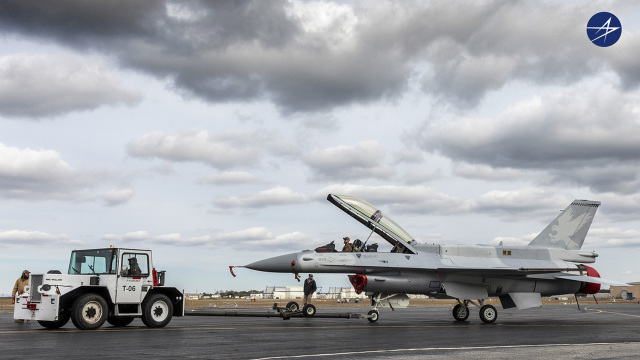It is reported that on November 21, 2022, the first F-16V (Viper) fighter of the Block 70/72 series of new construction was pumped out at the Lockheed Martin Corporation in Greenville (South Carolina) upon completion of manufacturing and painting. This also marked the completion of the transfer of serial production of F-16 fighters to the Greenville plant from the Lockheed Martin enterprise in Fort Worth (Texas), which had previously produced them since 1977, now completely given over to serial production of F-35 aircraft. Since the last serial F-16 was produced in Fort Worth in 2017 (for the Iraqi Air Force), now in fact the serial production of the F-16 has been resumed again after a five-year break.

The first new-built F-16V (Viper) fighter of the Block 70/72 series built at the Lockheed Martin Corporation in Greenville, South Carolina. The aircraft is a two-seat fighter F-16D Block 70 (US military number 18-0011, tail number "1611"), designed for the Bahrain Air Force. 11/21/2022 (c) Lockheed MartinThe first F-16V modification aircraft pumped out on November 21 in Greenville (Viper, the designation of the F-16C and D variants is officially preserved) is a two-seat F-16D Block 70 fighter (US military number 18-0011, tail number "1611") designed for the Bahrain Air Force, which became the launch customers of the F-16V of the new construction.
Recall that at the end of 2017, Bahrain signed an agreement under the US program of intergovernmental foreign military sales Foreign Military Sales (FMS) for the purchase of 16 Lockheed Martin F-16V fighters (ten single-seat F-16C and six double-seat F-16D) Block 70 of new construction (with an option for three more) and modernization This variant includes 20 Lockheed Martin F-16C/D (16 single and four double) Block 40 fighters of the Royal Bahrain Air Force (out of 22 received from 1990 to 2001). Initially, Bahrain negotiated the acquisition of 19 F-16Vs, which was reflected in the notification issued in September 2017 by the US Department of Defense Agency for Military Cooperation (Defense Security Cooperation Agency - DSCA), but in the end the agreement was concluded for 16 aircraft.
It is reported that the first flight of the aircraft pumped out on November 21 will take place in early 2023, after which the fighter will be transferred to the US government and will undergo flight tests and necessary export improvements at Edwards Air Base, and should be transferred to Bahrain via FMS in early 2024. All 16 aircraft of the new construction will be delivered to Bahrain in 2024-2025 - that is, about a year late compared to the contract terms, which is due to the delay in the development of F-16 production at the Greenville facility.
In total, Lockheed Martin has firm contracts for the supply of 128 newly built F-16V Block 70/72 aircraft through FMS, including the aforementioned 16 aircraft for Bahrain, 66 aircraft for Taiwan (Block 70 version), 24 for Morocco (Block 72), 14 for Slovakia (Block 70) and eight for Bulgaria (Block 70). Contracts for the supply of eight F-16V Block 70 fighters to Jordan and eight more to Bulgaria are being processed through the FMS mechanism.
In general, Lockheed Martin expects to maintain F-16 production in Greenville until 2030, having sold up to 300 new-built F-16 aircraft on the foreign market during this time. According to a representative of the corporation, the pace of work on the construction of Block 70 aircraft in Greenville will "significantly increase" in fiscal year 2023, reaching volumes of up to four aircraft per month. "We are always evaluating and looking for ways to increase production to meet customer needs," a Lockheed Martin spokeswoman said, "new digital design technologies have been introduced into the production line to maximize efficiency and reduce downtime. In addition, we have added more suppliers for certain components, such as our factory in Johnstown, Pennsylvania, to allow us to meet the program's current needs and future capabilities for new production F-16s."
In August 2020, the US Department of Defense announced the issuance to Lockheed Martin of a ten-year framework preliminary contract under the Indefinite-delivery/indefinite-quantity (IDIQ) scheme at a fixed price with a total volume of $ 62 billion for the production of F-16 fighter jets for export through FMS. The first part of this contract was a firm contract for the production of 90 F-16 fighters in the amount of $ 4.941 billion, with a deadline of December 31, 2026. It can be assumed that these 90 aircraft include 66 F-16Vs for Taiwan and 24 for Morocco. In January 2022, Lockheed Martin received an updated contract from the US Department of Defense with an indefinite delivery period and an indefinite number of aircraft worth up to $64.3 billion for the production of new-built F-16s for foreign customers through FMS, as well as for the modernization of 405 aircraft for foreign customers through FMS into the F-16V configuration.
Work on the modernization of F-16 fighters by a number of operators to the F-16V level is also being transferred to the Greenville facility from Fort Worth, as is the manufacture of appropriate modernization kits for work in customer countries. To date, the modernization of F-16 fighters of previous releases to the level of F-16V Block 70/72 has been ordered by Taiwan (the starting customer of the entire program under the 2016 contract, the modernization of 138 F-16A/B Block 20 aircraft, the delivery of upgraded aircraft is being carried out by the Taiwanese Aerospace Industrial Development Corporation since 2018), Greece (modernization 83 F-16C/D Block 52+ and Block 52+ Advanced, delivery of upgraded aircraft has been underway since September 2022, the main work is carried out in Greece), the aforementioned Bahrain (modernization of 20 F-16C/D Block 40) and Morocco (modernization of 23 F-16C/D Block 52+ fighters). As can be seen, work on the modernization of the first aircraft for Greece and cars for Bahrain was carried out and is still being carried out in Fort Worth, but, as stated, the Moroccan F-16s will already be fully modernized in Greenville.
In September 2021, the Turkish government sent an official request to the United States for the acquisition of 40 newly built F-16V Block 70 fighters through the FMS, as well as 80 modernization kits for upgrading to the Block 70 variant of available Turkish Air Force fighters.
The modification of the F-16V (Viper) Block 70/72 is claimed by Lockheed Martin as the most advanced version of the F-16 fighter family. This modification is equipped with a new Northrop Grumman AN/APG-83 Scalable Agile Beam Radar (SABR) with AFAR, a new Viper Shield electronic warfare system, a more powerful on-board computer, an updated cabin with large-format indicators, an upgraded engine, a thermal imaging search and tracking system, improved data transmission equipment, high-precision GPS navigation equipment and an automatic ground collision avoidance system (GCAS). The aircraft has the ability to integrate most types of American modern aviation weapons and the installation of conformal fuel tanks. The resource of the Block 70/72 aircraft is 12 thousand hours, which is twice as much as that of the previous F-16 series. The difference between the Block 70 and Block 72 modifications lies in the equipment with engines of the Pratt & Whitney F100 and General Electric F110 series, respectively.

Officially distributed by Lockheed Martin is a photograph of the first F-16V (Viper) fighter of the Block 70/72 series, newly built, with retouched Bahrain Air Force identification marks and tail numbers, built at its enterprise in Greenville, South Carolina. The aircraft is a two-seat fighter F-16D Block 70 (US military number 18-0011, tail number "1611"), designed for the Bahrain Air Force. 11/21/2022 (c) Lockheed Martin
